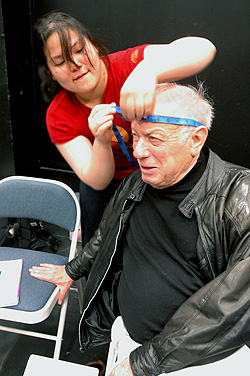Berkeleyan
 In Cradle Will Rock's scene 8, the heartless tycoon Mister Mister tries to recruit an academic willing to help put a good face on his union-busting effort; Professor Scoot, played by Leon Litwack, will have none of it. With him in rehearsal are (left to right) cast members Carl Holvick, Erin Maxon, Jeff Meanza (assistant director), and Cherie Rice. Sue-Ting Chene is at the piano.(Peg Skorpinski photo) |
Leon Litwack Rocks
Too late to audition for Streetcar or Salesman, the eminent historian prepares to tread the Berkeley boards
![]()
| 14 September 2005
Last week the renowned historian Leon Litwack found himself, for once, somewhat at a loss for answers.
Bearer of the weighty moniker Alexander F. and May T. Morrison Professor of American History, Litwack had no sooner arrived in the bowels of Zellerbach Playhouse than undergrad Holly Chou, wielding a blue tape measure, closed in to ask him a string of personal questions: "Suit size?" ("Not sure.") "Height? ("Six foot - at one time, anyway.") "Shoe size?" ("Big.") "Could I bother you to take off your shoe?" ("The size is probably in there somewhere; let's see.")
|
The Cradle Will Rock opens Oct. 7 at Zellerbach Playhouse and runs through Oct. 16; the Oct. 8 performance will be followed by a panel discussion with the directors and designers. Tickets - at $10 for campus staff and faculty - may be purchased at Zellerbach Playhouse from 1 to 4 p.m. on Fridays, as well as online. |
Litwack plays a minor role as a pacifist professor, whose lines he delivers in rhythmic speech: "I don't like military training/Military training of any kind/I'm a Tolstoyan." In a cadence that comes more naturally, after 40-plus years in the classroom and lecture hall, Litwack will appear, as well, as a professor- type who begins to lecture on the era, only to become absorbed in the play.
Lura Dolas, a longtime campus lecturer and accomplished stage actress, hopes Litwack's prologue will "emphasize the play's historical context and point to modern resonances." Without some orientation, she thinks, "a number of people in our audience will be baffled." (Some, however, may recall the recent Tim Robbins movie, likewise titled The Cradle Will Rock, depicting the play's dramatic 1937 New York premiere, under the direction of the boy-genius Orson Welles, after authorities seized sets, props, and costumes and padlocked the advertised venue in an attempt to shut it down.)
Initially, Litwack's role in the campus production was strictly behind the scenes - consulting with Dolas on historical aspects of the play. He also shared with the student cast his "visual lecture" on the '30s - a collage of sounds and images from the era, its underemployed and out-of-work, its Dust Bowl refugees, and its popular-culture ephemera.
"I always incorporate into my lectures the voices of everyday people and people long excluded from the American narrative," Litwack says. This interest, to which he's devoted a lifetime of scholarship, has much to do with his own parents, working-class immigrants from Russia who ended up in Santa Barbara (his father worked as a gardener there). In the 1950s, Litwack was a union delegate with the Marine Cooks and Stewards Union while working as a mess boy on freighters shipping out of San Francisco.
Brando and Cobb can rest easy
 Taking the man's measure: Holly Chou, an undergrad in the Department of Theater, Dance, and Performance Studies, fits Leon Litwack for headgear suited to one of his two roles in The Cradle Will Rock.(Peg Skorpinski) |
But not too late for a cameo appearance on the campus stage. Dolas says that, his theatrical inexperience notwithstanding, she jumped at Litwack's offer to join the cast - both for his sake ("the inner workings of backstage is a world new to Leon; he spent hours at auditions, just soaking it in") and that of her students ("I'm so happy they'll be able be around Leon, to soak up whatever he wants to impart.")
Fortunately for Litwack, rehearsals are in the evening, permitting him to focus his energies, earlier in the day, on part three of his trilogy on the black South (volume one, Been in the Storm So Long: The Aftermath of Slavery, won him a Pulitzer). And unlike the other cast members, he reports with relief, his parts require no singing - just a bit of memorization: In his role as narrator, Litwack holds forth for a good six minutes.
He's not worried, though. "I haven't memorized anything since high school. But I feel that even if I slip on a few lines," he says with a twinkle, "I should be fine - I know that period pretty well."

